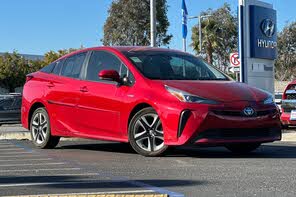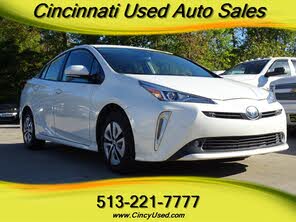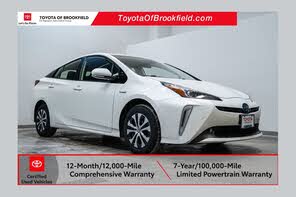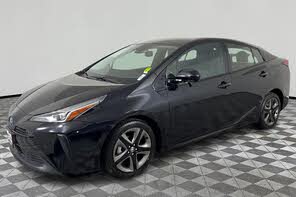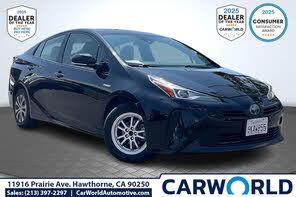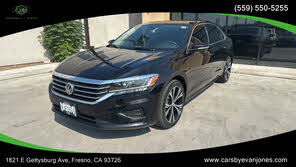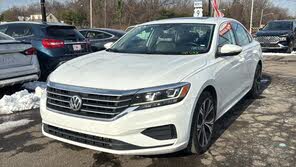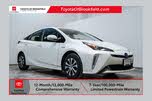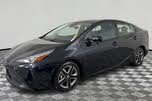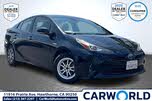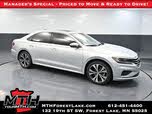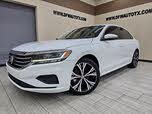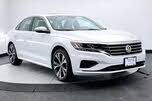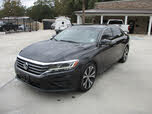2020 Toyota Prius vs 2021 Volkswagen Passat
Overview | |
MSRP$24,325 | MSRP$23,995 |
Listings108 | Listings217 |
Ratings & Reviews | |
User Reviews | User Reviews |
Expert reviews7.5 out of 10 | Expert reviews6.5 out of 10 |
Pros
Cons
| Pros
Cons
|
2020 Toyota Prius Reviews SummaryEver heard of an eponym? It’s a brand or product that is so popular that it’s come to define its respective market. Think of Kleenex for tissues or Band-Aid for medical bandages. For hybrids, the Toyota Prius has ascended to near-eponym status. It was one of the first—and remains one of the most popular—hybrids ever made. As automakers across the industry are rolling out more hybrid models, the Prius continues to be the standard-bearer of this genre. This is largely due to the fact that the Prius is a dedicated hybrid, rather than a hybrid variant of an existing model. Throughout the industry, different companies are taking different approaches to alt-fuel vehicles, including full-electric and hydrogen fuel cell powertrains. The Prius endures as the leader in hybrid power due to a focus on fuel efficiency that doesn’t compromise on style, drivability, and versatility. So how does the Prius hold its ground as more players enter the fray? Read on to find out. | |
2021 Volkswagen Passat Reviews SummaryDespite its German branding, the 2021 Volkswagen Passat is an All-American midsize sedan. It was developed specifically for the United States market, and it’s built in Chattanooga, Tennessee. In 2011, when the Americanized Passat was launched, VW thought the sedan was the key to dominating the U.S. market. Midsize sedans like the Honda Accord and Toyota Camry were still the default choice for most buyers at that time, after all. A lot has changed since then—SUVs are surging in popularity, and a diesel-emissions scandal has forced VW to focus more on electric cars—but the Passat rolls on. With the flashier Arteon now in the lineup, however, the Passat has been repositioned as VW's value-focused midsize sedan. The Passat got a significant update for the 2020 model year, so changes for 2021 are fairly limited. The previously-available Passat SEL trim level is gone, leaving just the base S, SE, and R-Line models. Adaptive cruise control is now standard across the board, and some trim levels get more standard equipment as well. Our test car was a mid-level SE model. | |
No video found | No video found |
Popular Features & Specs | |
Engine1.8L 121 hp I4 Hybrid | Engine2.0L 174 hp I4 |
Drive TrainFWD | Drive TrainFWD |
Seating Capacity5 | Seating Capacity5 |
Horsepower | Horsepower174 hp @ 5200 rpm |
EV Battery Capacity0.7 kWh | EV Battery Capacity |
MPG City58 | MPG City24 |
MPG Highway53 | MPG Highway36 |
Engine | |
Engine Name1.8L 121 hp I4 Hybrid | Engine Name2.0L 174 hp I4 |
Torque | Torque206 lb-ft @ 1700 rpm |
Horsepower | Horsepower174 hp @ 5200 rpm |
DrivetrainFWD | DrivetrainFWD |
Fuel Economy | |
EV Battery Capacity0.7 kWh | EV Battery Capacity |
MPG City58 | MPG City24 |
MPG Highway53 | MPG Highway36 |
Interior | |
Seating Capacity5 | Seating Capacity5 |
Safety | |
Front Crash Overall4 | Front Crash Overall4 |
Side Crash Overall5 | Side Crash Overall5 |
Dimensions & Capacity | |
Cargo Space27.4 cu ft | Cargo Space15.9 cu ft |
Curb Weight3010 lbs | Curb Weight3314 lbs |
Height57.9 in | Height58.7 in |
Length180.0 in | Length193.6 in |
Width69.3 in | Width72.6 in |
Wheelbase106.3 in | Wheelbase110.4 in |
Maximum Payload825 lbs | Maximum Payload948 lbs |
Number of doors4 | Number of doors4 |
Overview | ||
MSRP | $24,325 | $23,995 |
Listings | ||
Ratings & Reviews | ||
User reviews | ||
Expert reviews | 7.5 out of 10Read full review | 6.5 out of 10Read full review |
Pros & cons | Pros
Cons
| Pros
Cons
|
Summary | Ever heard of an eponym? It’s a brand or product that is so popular that it’s come to define its respective market. Think of Kleenex for tissues or Band-Aid for medical bandages. For hybrids, the Toyota Prius has ascended to near-eponym status. It was one of the first—and remains one of the most popular—hybrids ever made. As automakers across the industry are rolling out more hybrid models, the Prius continues to be the standard-bearer of this genre. This is largely due to the fact that the Prius is a dedicated hybrid, rather than a hybrid variant of an existing model. Throughout the industry, different companies are taking different approaches to alt-fuel vehicles, including full-electric and hydrogen fuel cell powertrains. The Prius endures as the leader in hybrid power due to a focus on fuel efficiency that doesn’t compromise on style, drivability, and versatility. So how does the Prius hold its ground as more players enter the fray? Read on to find out. | Despite its German branding, the 2021 Volkswagen Passat is an All-American midsize sedan. It was developed specifically for the United States market, and it’s built in Chattanooga, Tennessee. In 2011, when the Americanized Passat was launched, VW thought the sedan was the key to dominating the U.S. market. Midsize sedans like the Honda Accord and Toyota Camry were still the default choice for most buyers at that time, after all. A lot has changed since then—SUVs are surging in popularity, and a diesel-emissions scandal has forced VW to focus more on electric cars—but the Passat rolls on. With the flashier Arteon now in the lineup, however, the Passat has been repositioned as VW's value-focused midsize sedan. The Passat got a significant update for the 2020 model year, so changes for 2021 are fairly limited. The previously-available Passat SEL trim level is gone, leaving just the base S, SE, and R-Line models. Adaptive cruise control is now standard across the board, and some trim levels get more standard equipment as well. Our test car was a mid-level SE model. |
Video | No video found | No video found |
Popular Features & Specs | ||
Engine | 1.8L 121 hp I4 Hybrid | 2.0L 174 hp I4 |
Drive Train | FWD | FWD |
Seating Capacity | 5 | 5 |
Horsepower | 174 hp @ 5200 rpm | |
EV Battery Capacity | 0.7 kWh | |
MPG City | 58 | 24 |
MPG Highway | 53 | 36 |
Engine | ||
Engine Name | 1.8L 121 hp I4 Hybrid | 2.0L 174 hp I4 |
Torque | 206 lb-ft @ 1700 rpm | |
Horsepower | 174 hp @ 5200 rpm | |
Drivetrain | FWD | FWD |
Fuel Economy | ||
EV Battery Capacity | 0.7 kWh | |
MPG City | 58 | 24 |
MPG Highway | 53 | 36 |
Interior | ||
Seating Capacity | 5 | 5 |
Safety | ||
Front Crash Overall | 4 | 4 |
Side Crash Overall | 5 | 5 |
Dimensions & Capacity | ||
Cargo Space | 27.4 cu ft | 15.9 cu ft |
Curb Weight | 3010 lbs | 3314 lbs |
Height | 57.9 in | 58.7 in |
Length | 180.0 in | 193.6 in |
Width | 69.3 in | 72.6 in |
Wheelbase | 106.3 in | 110.4 in |
Maximum Payload | 825 lbs | 948 lbs |
Number of doors | 4 | 4 |
The 2020 Toyota Prius retained its iconic jellybean-like shape, a design optimized for aerodynamic efficiency. This shape, consistent since the second generation, evolved with visual tweaks to resemble a sedan while maintaining its hatchback functionality. The Prius's futuristic style, with its central instrumentation and gauges, continued to look contemporary despite the industry's advancements. The cabin's unorthodox design, a hallmark for over 20 years, defined the Prius's unique interior.
In contrast, the 2021 Volkswagen Passat's exterior styling remained largely unchanged from its 2020 facelift, which was the first major update in nearly a decade. The Passat's design bore a strong resemblance to the smaller Jetta, offering a more understated look compared to its rivals. Its aerodynamic shape, reminiscent of 1990s sedans, contributed to a drag coefficient of 0.28. The Passat's interior followed a clean, functional design with well-placed analog controls, enhancing visibility and ease of use, though some might find it plain.

















The 2020 Toyota Prius featured a 1.8-liter four-cylinder engine paired with an electric motor, producing a combined 121 horsepower and 105 pound-feet of torque. Available in both front-wheel drive (FWD) and all-wheel drive (AWD-e) variants, the Prius offered smooth acceleration and seamless transitions between electric and conventional power. It had three drive modes—EV, Eco, and Power—each catering to different driving needs. The unique shifter design and Engine Braking mode added to its distinctive driving experience, making it engaging yet efficient.
The 2021 Volkswagen Passat, on the other hand, came with a single powertrain option: a 2.0-liter turbocharged four-cylinder engine delivering 174 horsepower and 206 pound-feet of torque, paired with a six-speed automatic transmission and FWD. While the torque was impressive, the horsepower was below average compared to rivals. The Passat's power delivery felt uneven at higher speeds, though switching to Sport mode or manually selecting gears improved responsiveness. Overall, the Passat offered a plain driving experience, lacking the sportiness or comfort found in competitors like the Honda Accord and Mazda 6.
The 2020 Toyota Prius made excellent use of its compact platform, offering spacious and comfortable front seats with good visibility. The rear seats provided ample space, though taller passengers needed to be cautious. The Prius excelled in cargo space, with 50.7 cubic feet available with the rear seats folded and up to 27.4 cubic feet with the seats up, making it one of the most versatile hybrids.
The 2021 Volkswagen Passat boasted 39.1 inches of rear legroom, slightly less than some competitors, and sacrificed front legroom and headroom. The driving position was uncomfortable for many, with limited thigh support and flat rear seats. The Passat offered 15.9 cubic feet of cargo space, more than some rivals but less than others. Its control layout was user-friendly, with big buttons and knobs, though the interior materials and storage options were basic.
The 2020 Toyota Prius came standard with a 7-inch touchscreen, Android Auto, Apple CarPlay, Bluetooth, a WiFi hotspot, and three USB ports. The Limited trim upgraded to an 11.6-inch screen with a customizable layout, though it lacked Android Auto. The Prius also offered satellite radio, HD Radio, a head-up display (HUD), and a 10-speaker JBL audio system. The top-center instrument panel, a defining feature, provided critical readouts and hybrid status.
The 2021 Volkswagen Passat featured a 6.3-inch touchscreen with Apple CarPlay, Android Auto, Bluetooth, and SiriusXM. The R-Line trim added HD Radio, navigation, and an eight-speaker Fender audio system. A single USB-A port was standard, with two additional rear charge-only ports on SE models. The Passat's infotainment system was simple and functional, though it lacked advanced features like the Digital Cockpit or MIB3 system found in other VW models.
The 2020 Toyota Prius came equipped with Toyota Safety Sense 2.0, including automatic emergency braking, forward-collision warning, lane-departure warning, adaptive cruise control, and automatic high beams. Optional features included blind-spot monitoring, rear cross-traffic alert, parking sensors, and lane-tracing assist. The Prius earned a five-star NHTSA rating and a "Top Safety Pick" from the IIHS, though it fell short of the highest rating due to average scores in some tests.
The 2021 Volkswagen Passat received top "good" scores in IIHS crash tests, but its headlights earned a "marginal" rating. NHTSA ratings were not available. Standard safety features included adaptive cruise control, forward-collision warning, automatic emergency braking, blind-spot monitoring, rear cross-traffic alert, lane-keep assist, and automatic high beams. The Passat also featured VW’s Automatic Post-Collision Braking System and Intelligent Crash Response System.
CarGurus highlights

According to CarGurus experts, the overall rating for the 2020 Toyota Prius is 7.5 out of 10, while the 2021 Volkswagen Passat scores 6.5 out of 10. Based on these ratings, the 2020 Toyota Prius is the recommended choice, offering better overall performance, versatility, and safety features.
Choose the 2020 Toyota Prius if:
- You prioritize fuel efficiency and seamless hybrid performance.
- You need a versatile vehicle with ample cargo space.
- You value advanced safety features and high safety ratings.
Choose the 2021 Volkswagen Passat if:
- You prefer a midsize sedan with a simple, functional interior.
- You need a car with good rear legroom and straightforward controls.
- You want a vehicle with standard adaptive cruise control and basic driver aids.
CarGurus highlights

According to CarGurus experts, the overall rating for the 2020 Toyota Prius is 7.5 out of 10, while the 2021 Volkswagen Passat scores 6.5 out of 10. Based on these ratings, the 2020 Toyota Prius is the recommended choice, offering better overall performance, versatility, and safety features.
Choose the 2020 Toyota Prius if:
Shop Now- You prioritize fuel efficiency and seamless hybrid performance.
- You need a versatile vehicle with ample cargo space.
- You value advanced safety features and high safety ratings.
Choose the 2021 Volkswagen Passat if:
Shop Now- You prefer a midsize sedan with a simple, functional interior.
- You need a car with good rear legroom and straightforward controls.
- You want a vehicle with standard adaptive cruise control and basic driver aids.

By: CarGurus + AI
At CarGurus, our team of experienced automotive writers remain at the heart of our content operation, conducting hands-on car tests and writing insightful guides that are backed by years of industry experience. To complement this, we are harnessing AI to make our content offering more diverse and more helpful to shoppers than ever. To achieve this, our AI systems are based exclusively on CarGurus content, ratings and data, so that what we produce is both unique to CarGurus, and uniquely helpful to car shoppers.

